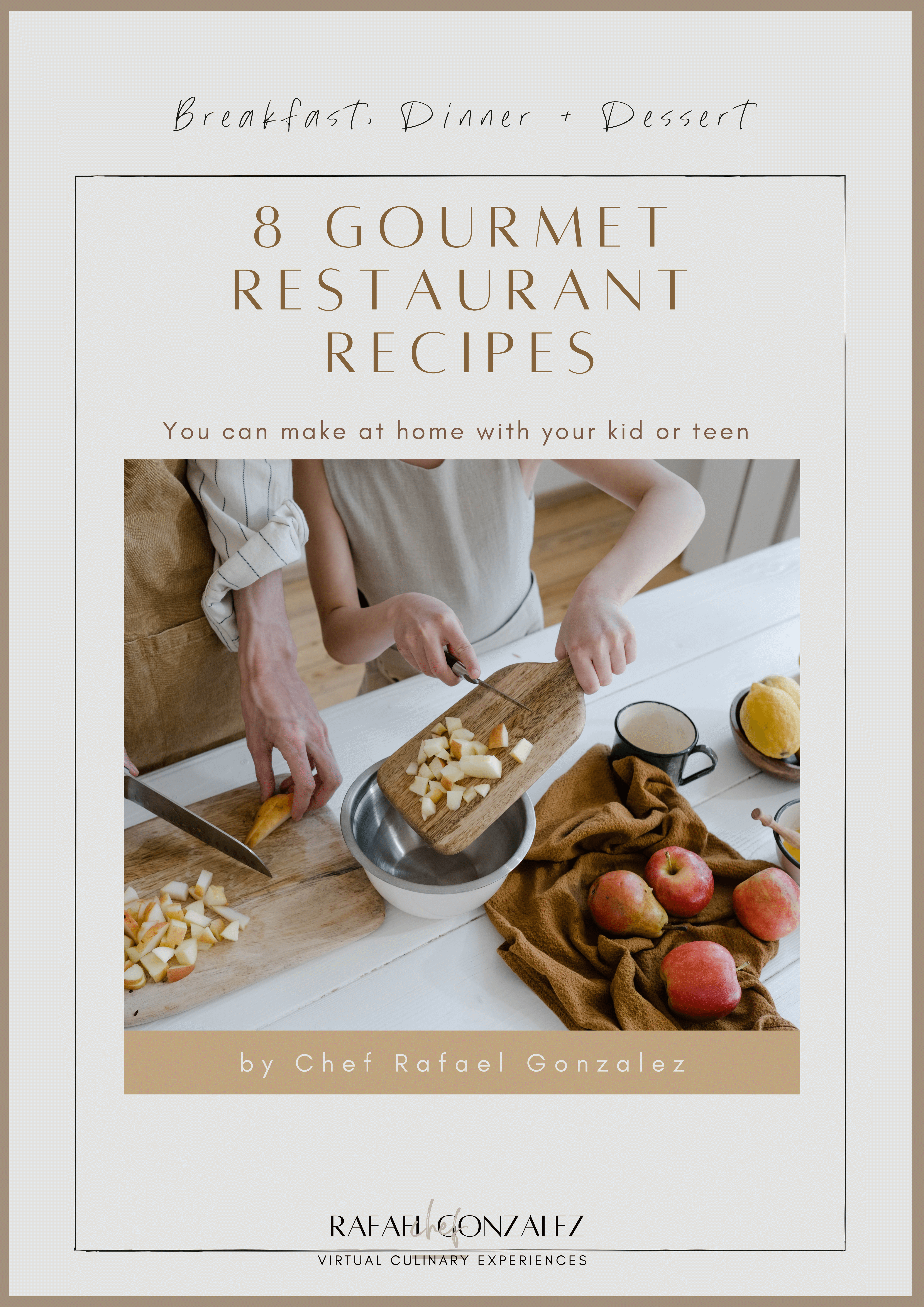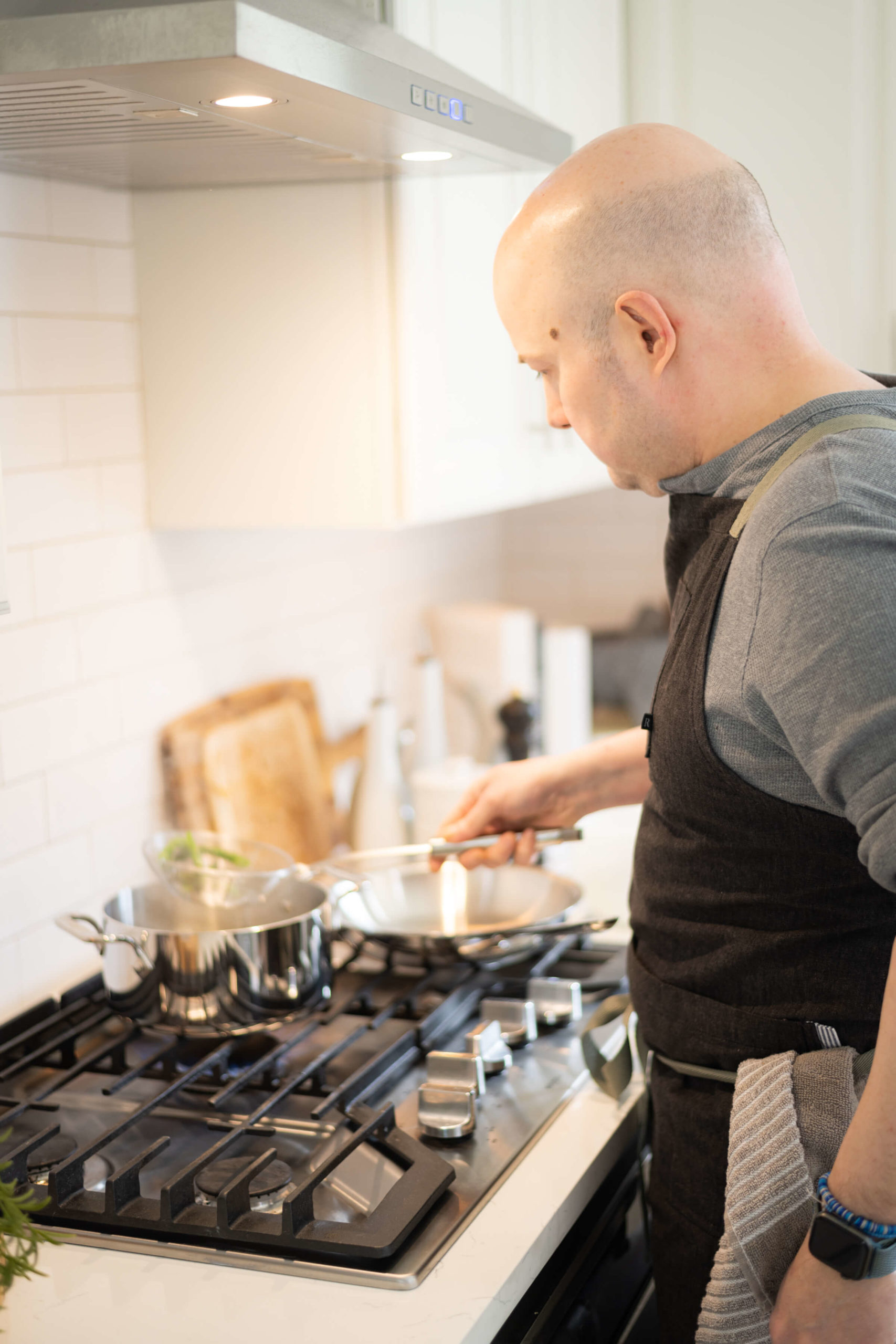
How does cooking benefit your mental health?
A friend of ours poured her heart out to her new therapist. Depression and anxiety were leaving her unable to balance all the demands in her life, and she needed help. Her family members was stretched to its limits, and as a single parent, she’d learned to rely on frozen prepared foods and takeout for all her nutrition.
The therapist gave her a long, steady look. “All right then, your homework for this week is to go do some grocery shopping, buy a nice prime steak, cook it at home and enjoy it with your family.”
My friend thought it was a weird thing for a therapist to say, but she was a good patient. So she did what he asked. She had reached out to us for emotional support for some tips and we were more than happy to jump on a quick zoom call and gave her the how-to from our home kitchen. While we are not experts in mental health issues, nor are we qualified to give professional help, we were there for her support network.
And it proved to be her first step to a better life.
Why Did the Therapist Recommend Cooking for Mental Health for Adults and Children?
Cooking can help someone break out of the depressive cycle because it’s not just a simple chore. Whether we are parents of young children or parents of adult children, family therapy in the kitchen is one of the best ways to manage our mental health care.
I know for a fact that for me personally, it is a reprieve from a busy schedule at work. It allows me to do something for my family that makes them and me happy. Cooking engages you physically, mentally, and socially in something larger than yourself. It is good for both the adult and child.
Look at all the steps involved in cooking anything, even something as simple as a single steak:
YOU HAVE TO THINK ABOUT THE FUTURE, IF ONLY FOR A MOMENT
- “I will cook a steak.” Suddenly you have a clear goal, and it’s a goal that you can actually meet. It’s a short term goal with an easy win. You got this!
YOU HAVE TO GO OUT TO THE STORE
- Well, fine, you could order delivery. But if you’re honest with yourself, that’s a cop out. If you go out to the store, you’re breaking out of yourself. You interact with people as you buy your ingredients, you think about side dishes you’d like, you smile at the person who helps you check out, and they tell you to have a nice day.
YOU HAVE TO PAY ATTENTION TO YOUR BODY
- Cooking uses your senses. You have to see how the steak is cooking, listen to the sizzle, smell the aroma, feel the texture of the meat, and finally taste the result. If you’ve been living in your head too much, cooking can help you rejoin the world. If you think about it, it’s a great exercise for mindfulness.
YOU HAVE ONE SMALL THING YOU CAN CONTROL
- Depression and anxiety can make you feel like you don’t have any agency. Things just happen to you, you have no control. Cooking a steak gives you agency over one very small thing.
YOU FEEL A SENSE OF ACCOMPLISHMENT
- Life is a series of never-completed tasks, but with cooking, you complete something. You make a meal, and then you eat the meal. You’re suddenly moving forward instead of spinning your wheels.
YOU CAN OPEN UP YOUR WORLD IN DIFFERENT WAYS
- Once you’ve cooked one meal, you can take the next step. Do you want to try an unfamiliar recipe? Do you want to invite a friend over to cook with you? Do you want to shop at an ethnic grocer and see what inspires you?
That Sounds Great, But Does Cooking for Mental Health Really Work?
According to research, yes. A 2017 study from the National Institutes Of Health found that cooking intervention can improve the ability to socialize and can increase self-esteem. In 2021, a Japanese Study found that cooking with a caring adult improved behavior, sociability, and resilience in children. And finally, a New Study Out Of Australia Found that a 7-week cooking class improved confidence and mental health in at-risk adults.
Takeout meals and convenience foods can be a life-saver when life gets busy, but cooking is essential to who we are as human beings. The act of preparing our meals roots us in our physical environment improves our confidence, and can even break us out of the bad thought cycles that trap us in our depression and anxiety.
Do you or someone you love need a small change to break thought patterns and feel a sense of accomplishment? Try a cooking class and experience the big changes that can come from a small action.

Adult & Child Health
There are so many individuals grappling with mental health issues across every age group. Mental health conditions don’t operate on a nine-to-five schedule. For young adults, children, and their family members, there has to be a way to integrate something as simple as cooking into their daily lives.
It’s a good idea to incorporate cooking as a family into your routine.
The Crisis of Mental Health in Young Families
In recent years, there has been a rise in mental health issues affecting both young children and adults. Early childhood, after all, sets the foundation for emotional health and quality of life later on.
By offering emotional support, family therapy, and addressing mental health disorders head-on, cooking is is an easy, yet practical way to somehow address mental illnesses. It’s not an instant cure for serious mental illness, but at least it helps is some way. Small steps lead to great results.
Every individual, regardless of age, ethnic background, or the challenges they face—be it mood disorders, hyperactivity disorder, mental disorders, anxiety disorders, bipolar disorder or any other type of mental health disorder, should seek treatment options first from their primary care provider to get recommendations for a mental health professional.
The Role of Parent in Supporting Healthy Children
As a chef and wife team dedicated to promoting healthy family lifestyles through cooking, we understand the profound impact that parents can have on supporting the mental health and well-being of their children. While we may not be mental health professionals, our firsthand experience has shown us the transformative power of creating nutritious meals together as a family.
Cooking not only fosters essential life skills and healthy social interactions but also provides a safe and nurturing environment for emotional support and growth.
Through activities such as family therapy and parent-child interaction in the kitchen, parents play a pivotal role in nurturing healthy children and promoting positive mental health outcomes.
By prioritizing mental health care and fostering open communication, families can create a supportive atmosphere that encourages emotional milestones and strengthens the reciprocal relationship between parents and children.
Together, we believe that cooking can be a cornerstone of building a strong foundation for the mental health and well-being of individuals of all ages, fostering a safe place where unconditional love and healthy development thrive.
A Brighter Tomorrow for Mental Health
As we reflect on the significant role that cooking and family meals play in promoting mental health and well-being, we envision a brighter tomorrow for families everywhere.
In the United States and beyond, the importance of supporting children’s mental health cannot be overstated. Evidence-based practices such as talk therapy and parent-child interaction therapy offer valuable tools for nurturing the mental health of children and promoting their healthy development.
Engaging in social activities and participating in support groups can also play a huge role in providing emotional support and fostering positive relationships within the family unit and the broader community.
As caregivers, we recognize that the best way to support children’s mental health is through a holistic approach that emphasizes open communication, healthy social skills, and meaningful parent-child interactions.
By prioritizing these essential components, families can create an environment where children feel empowered, valued, and supported in their journey towards emotional well-being. Together, let us continue to advocate for the mental health of children and embrace evidence-based practices that nurture their growth and resilience.
Through the simple act of coming together in the kitchen, families have the opportunity to cultivate healthy social skills, create lasting memories, and nourish both body and soul. While mental health care may seem daunting at times, the power of cooking provides a tangible and accessible way for families to support each other and foster positive mental health outcomes.
By embracing the joy of cooking and the connection it brings, families can begin a journey toward greater emotional support, improved quality of life, and strengthened relationships.
Let us continue to celebrate the best things in life – good food, unconditional love, and the shared experience of cooking together – as we work towards a happier, healthier future for all.
Are we connected yet?


Try other easy restaurant favorites to make at home
I share a lot of recipes, mostly of restaurant classics that our family enjoys to eat at home. Give it a shot! You can make this too!
Beer And Vodka Battered Crispy Cod Fish Tacos With Chili-Lime Crema And Red Cabbage Slaw
Arugula Flatbread With Goat Cheese, Prosciutto And Mushrooms
Be the first to comment